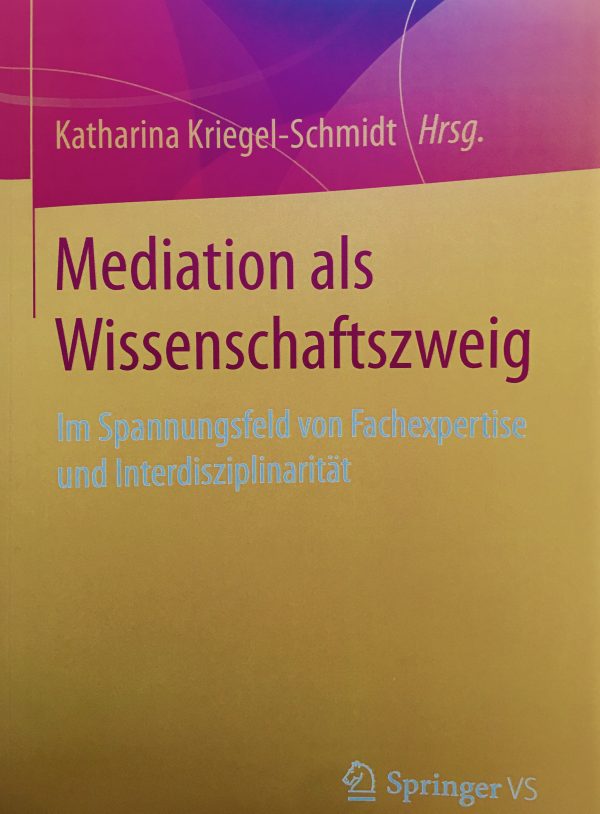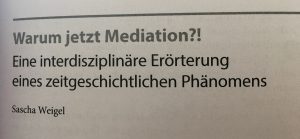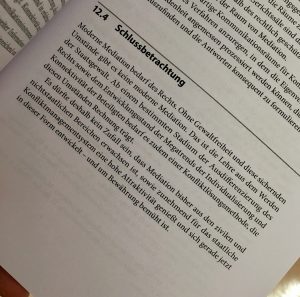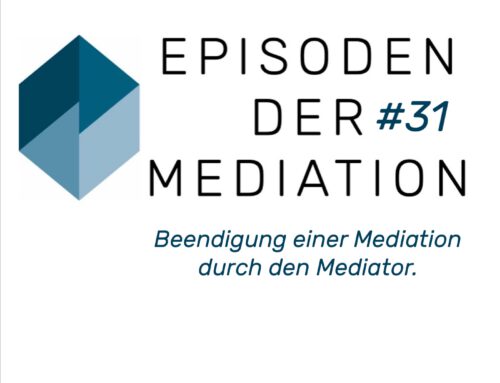Why mediation now?
in: Mediation as a subject of research. Towards a German-language mediation science; to be published in 2017; edited by Prof. Dr K. Kriegel-Schmidt; p. 143 – 159.
Extract: Why mediation now?
An interdisciplinary discussion of a contemporary historical phenomenon
- Introduction and research question
In the literature on mediation, key questions dominate the discussion, focussing primarily on how (good or successful) mediation is conducted and how it fits into the individual and societal conflict management repertoire.
The following text is intended as a suggestion and initial answer to why mediation is now emerging - and why modern mediation is actually being created. What are the circumstances that have led to the emergence of modern mediation in science, teaching and practice, albeit with varying degrees of intensity, throughout society? For which problem is this modern mediation the solution?
In doing so, the thesis is explored that the conflict resolution procedures that have proven their worth in society to date, above all the state-organised legal system, do not offer the procedural solution that the parties involved (additionally) need due to changing social circumstances. According to the thesis, there is a need for procedures that offer more intensive opportunities for participation and co-determination in order to take account of the "megatrends" of individualisation (personal responsibility) and connectivity (connection).
The research question is simple, but not easy: Why mediation? Why now? Why not earlier? Why not wait a little longer and use "tried and tested" conflict resolution methods? Mediation is demanding, requires a high level of social skills, is emotionally costly and there is no guarantee that a joint solution will be found. The saying "Please don't help, it's hard enough as it is!" could certainly be applied to the offer of mediation.
But no, mediation is an obvious choice in conflict situations, is also attracting more and more attention in society (implicit thesis) and is gaining ground in general knowledge and the general repertoire of behaviour (explicit hope).
The core topic of the article is the question of why mediation is "now" emerging as a conflict resolution method, why it is giving rise to national and supranational laws and regulations, and why it is virtually the standard-bearer of extrajudicial dispute resolution methods.
- on the one hand, implicitly criticising the judicial practice of the states (keyword: personal responsibility),
- On the other hand, all the communicative teaching and experience values from (depth, behavioural and humanistic) psychology, sociology and the other social sciences, practically implementing them for everyone and thus implicitly competing?
- Implicit thesis
The question of the reason for the emergence of mediation implies the assumption that mediation is actually emerging and was not already present, albeit inconspicuously. Or to put it another way: Is mediation really only now emerging and being increasingly used and reflected upon, or is it a long-existing phenomenon that is only now and for whatever reason receiving social, media attention? This hypothesis is currently insufficiently substantiated, as the relevant data is neither available nor has it been analysed. However, the following points can already be noted:
"Mediation" is an ancient process - and not a new invention: it goes without saying that early evidence can be found in which the idea of involving a neutral third party in conflict resolution is alluded to and corresponding events are described. We find such evidence both in the Western European tradition, e.g. in diplomatic efforts in ancient times, whereby the special role of the gods must be emphasised here (which is often omitted), and in the - frequently mentioned - modern efforts, e.g. by the mediator Contarini for the sake of the Peace of Westphalia. We find even clearer evidence describing the "mediative attitude", ethics and philosophy in other cultures, e.g. in China and Japan, whose religion and philosophy seem to be more orientated towards harmony and consensus and whose procedures have a long tradition similar to modern mediation.
However, the lines of development should not be blurred or presented as parallels. The Asian sources alluded to here may have contributed to the emergence of modern mediation, first in North America and then in Western Europe. However, as far as can be seen, there is still a lack of substantiating research into the effects of the reciprocal relationships and references.
Another circumstance is relevant to the thesis put forward here that modern mediation emerged, if not independently, then in a novel way. In the 19th and 20th centuries, it was the countries of Western Europe, which were characterised by their state and legal constitutions, that served as models worldwide. China and Japan in particular endeavoured and succeeded in adopting and practically transferring the major codifications of civil and criminal law as well as the constitutional models of Western Europe (including the USA). Those countries whose cultural philosophies are considered to have an affinity for mediation were particularly keen to adopt Western European legislation, especially on private law, and use it for their own purposes (in some cases unchanged!), above all to secure and protect individual rights. Because that was what a "civically organised" society apparently needed above all…„
- Title of the contribution
- Conclusion of the article
- Mediation as a branch of science, collection of essays







